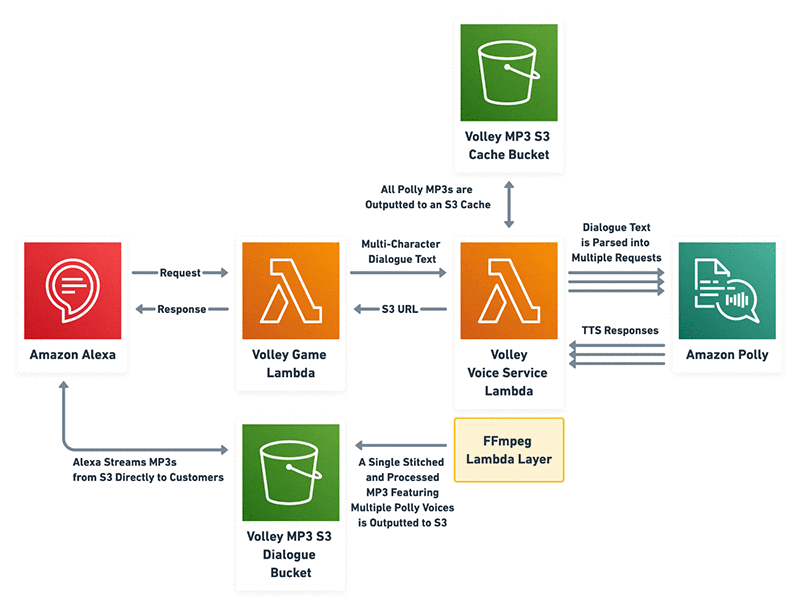Voicing play with Volley, where words are the gameboard and Amazon Polly brings the fun
Voice-powered experiences are gaining traction and customer love. Volley is at the cutting edge of voice-controlled entertainment with its series of popular smart-speaker games, and many aspects of Volley rely on Amazon Polly.
Every day, more and more people switch on lights, check the weather, and play music not by pushing buttons but with verbal commands to smart speakers. Volley is a San Francisco–based startup co-founded in 2016 by former Harvard roommates Max Child (CEO) and James Wilsterman (CTO). They’re on a mission to use smart speakers as the basis for building fun experiences.
Volley creates games of all sorts, from song quizzes to political satire to role-playing games. Many of the latter, such as “Yes Sire,” feature choose-your-own-adventure style games, in which infinite dialogue permutations can flow from each player’s choices. Volley relies heavily on Amazon Polly to enable these growing dialogue permutations amid multiple characters’ interactions.
“We associate each character with a particular Amazon Polly voice,” said Wilsterman. “Our on-the-fly TTS generation only works because Amazon Polly’s text-to-speech API latency is low enough to be essentially imperceptible to the user.”
From a cost perspective, the comparison is a no-brainer: hiring voice actors to voice the games would be a thousand times more expensive (literally–Volley ran the numbers). Amazon Polly has reaction speed nailed, with faster reactions than a human option. It also provides more diverse characters and reactions than recorded, scripted voice actors.
“We want our games to showcase diverse, memorable characters,” said Wilsterman. “We appreciate that Amazon Polly supports many different languages, accents, and age ranges to help us in that effort.” For example, Amazon Polly’s built-in German language support proved essential to Volley’s recent launch of a localized version of “Yes Sire” for Germany (called “Ja Exzellenz”).
Along with Amazon Polly, many other AWS services support Volley’s fun and games. This platform choice dates to Volley’s beginnings, when the co-founders were looking for the best services to host backend game logic and store persistent customer data.
“We realized quickly that AWS Lambda and Amazon DynamoDB would be ideal options,” said Wilsterman. He soon discovered that AWS also offered appealing scalability and affordability. The Volley team now uses Lambda not only to host the backend logic for their games but also to host a variety of internal tools and microservices deployed through Lambda functions.
DynamoDB supports Volley’s games by storing persistent data like users’ scores and levels, so they can return to the games and pick up right where they left off. And many of the in-game assets are stored in Amazon S3, which makes them instantly accessible to the backend Lambda functions. All those pieces are visualized together in the following workflow diagram.

Volley recently added a layer of sophistication to its machine learning work with Amazon SageMaker. They’re using Amazon SageMaker to strengthen their business by understanding user behavior and promoting their games accordingly. Specifically, the Volley team faces a bit of challenge because users don’t carry persistent tags. So, if someone finishes playing “World Detective” and immediately starts to play “Castle Master,” there is no way to identify that they’re the same user.
As a result, the Volley team must find creative ways to measure the impact of their cross-promotional efforts. With Amazon SageMaker, they can predictively generate the outcomes of their marketing based on the active users of each of the games and the timestamps. That helps them make sure that future marketing is better-targeted—and that future games meet the audience trends that Volley is seeing.
As Volley continues to expand its repertoire, the team is also considering new directions beyond sheer entertainment. “Self-improvement is an interesting space, like meditation, fitness, and other coaches,” said Wilsterman. “Also, learning and teaching. We are constantly asking, ‘What new experiences can be possible with voice as an input?’”
No matter what Volley chooses to pursue next, one thing is for sure: their cloud platform of choice. “The entire architecture runs on AWS; we use it for everything from storage to machine learning,” said Wilsterman.
About the Author
 Marisa Messina is on the AWS ML marketing team, where her job includes identifying the most innovative AWS-using customers and showcasing their inspiring stories. Prior to AWS, she worked on consumer-facing hardware and then university-facing cloud offerings at Microsoft. Outside of work, she enjoys exploring the Pacific Northwest hiking trails, cooking without recipes, and dancing in the rain.
Marisa Messina is on the AWS ML marketing team, where her job includes identifying the most innovative AWS-using customers and showcasing their inspiring stories. Prior to AWS, she worked on consumer-facing hardware and then university-facing cloud offerings at Microsoft. Outside of work, she enjoys exploring the Pacific Northwest hiking trails, cooking without recipes, and dancing in the rain.
Tags: Archive

Leave a Reply